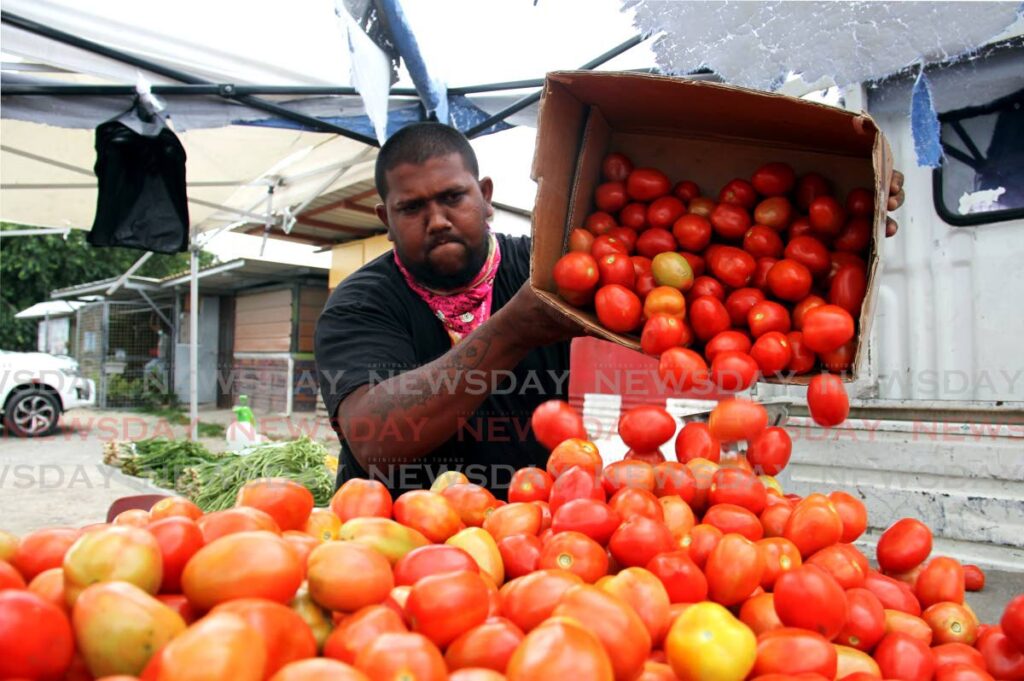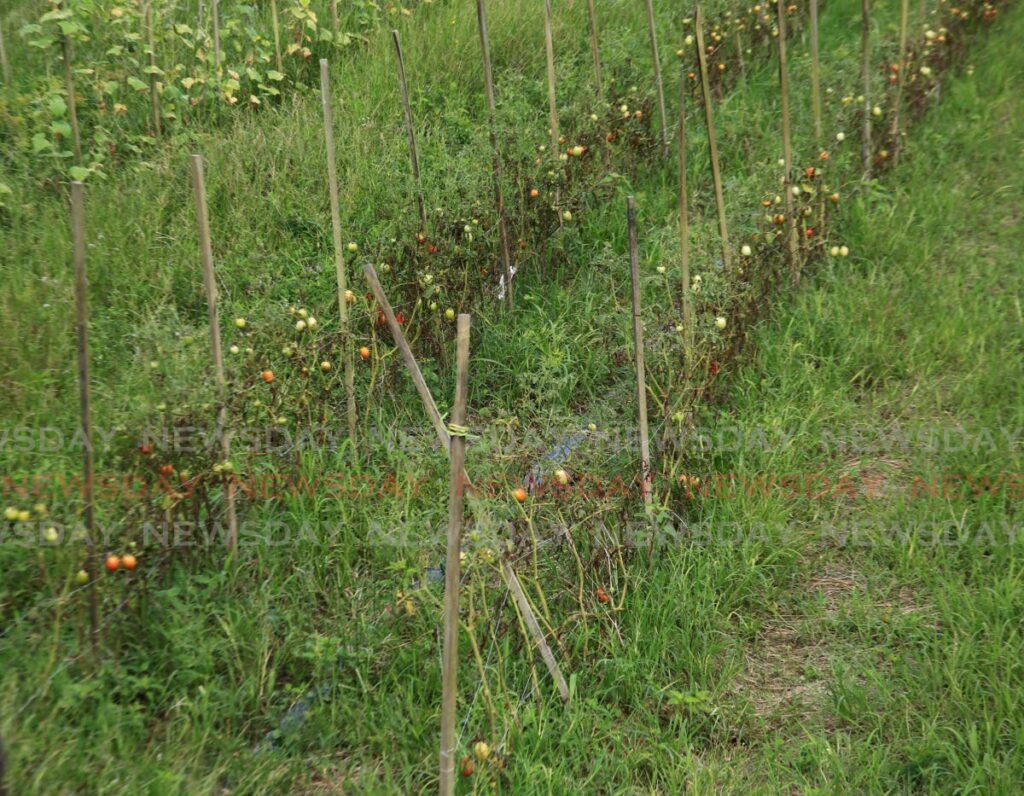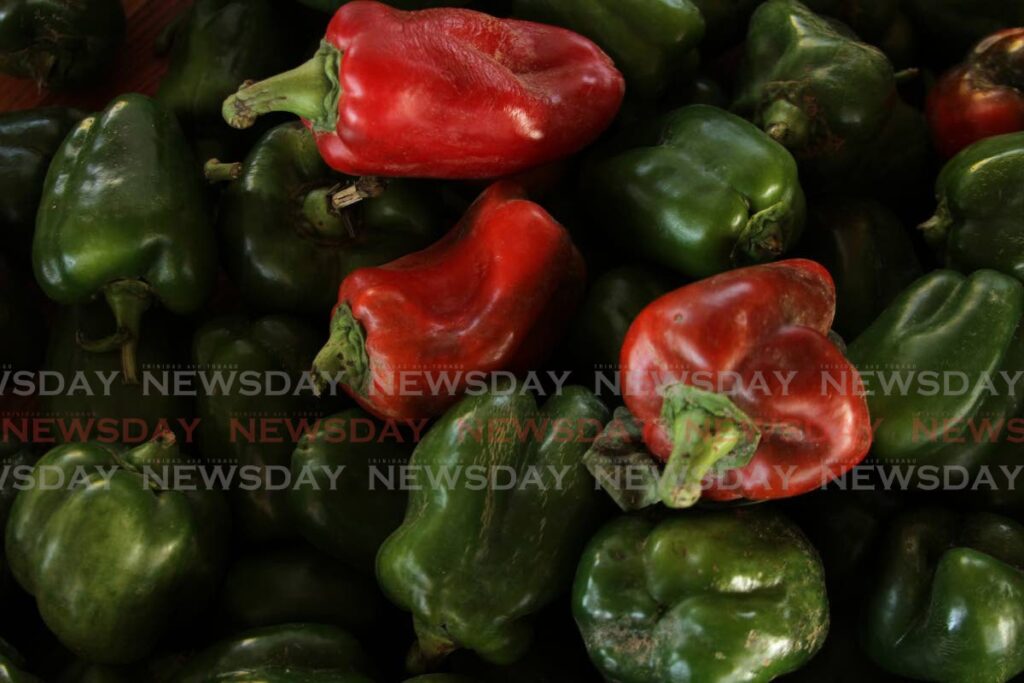Agri Society takes steps to protect farms from floods

“We have lost close to 75 per cent of the crop production in TT.”
That's the claim of president of the Agricultural Society of TT Daryl Rampersad after devastating floods in the past two months drowned acres of crops nationwide.
“Prices are already at an all-time high, and for the year of 2022, these prices that are recorded now are some of the highest prices we’ve ever seen in the last 20 years,” he said.
He said vegetables such as tomatoes and sweet peppers around this time would usually be $6- $10 per pound, but now both are around $25 per pound on the retail market, while celery is being sold at $20 per pound.
“Right now we are hoping we don’t pass that amount currently. We are hoping that the market is going to stabilise and then we are going to see a decrease as production increases, going into the dry season. But as it is, the prices we have now are going to be maintained until the end of the year, given the availability of the commodity.”
He said this problem goes beyond the farmer, as low-income households will also be affected, as prices may increase again, depending on the situation, and there would be a lack of availability of some items.
Rampersad said the society is working on a plan to assist farmers with moving into protected farming.
“We’ve already started formulated a plan and started discussions outside. For example, the European Union, they introduced other methods of protected agriculture in TT.
If we are to look at food security and food sustainability in TT, we need to look at how we protect our agriculture we have existing in TT right now. So that’s a step we are going to be taking in 2023, once it comes through. It’s what we are going to be looking at in the near future for food security.”

He said this plan entails setting up trail houses and above-ground fences in each of the farming areas.
“Using that as an example, and a programme called 'Each One, Teach One,' we are going to be using those as demos for the rest of the farming community to learn and observe from. Then we are going to have discussions with the ADB (Agricultural Development Bank) and our other partners to bring them on board, making finance available for such a project, where it would be more acceptable for the farmers of TT to move into the future of agriculture, Because we can’t afford to continue absorbing the losses as we have been doing this year.”
Given the widespread losses incurred by farmers owing to floods, Rampersad intends to approach the Ministry of Agriculture and Ministry of Finance to compensate all producing farmers who suffered losses, not only registered farmers.
“We are hoping and we are asking – I just finished preparing a document as it pertains to the incentive programme, where we are asking that consideration be given to all farmers in production at this point in time. If any form of compensation is coming forward, we are asking that even the farmers who are unregistered receive some assistance to restart their production.”
One market retailer, Joshua Hercules, said because he’s based in Corinth Hills, San Fernando and caters to the people living in that area, he has adjusted his prices to suit.
“The people in my community live on a day-to-day buying basis and they would not have been able to afford $20 per pound of tomatoes. I gave customers the option to not pay for a full pound, so if an item is $25 per pound, I gave them the option purchasing half a pound or even quarter of a pound.”
Hercules said while this was an effective business strategy, he still had to forego buying certain produce because of the exorbitant prices, which has resulted in a loss of profit for him, as he had fewer items at his stall.
Rampersad said, “What we can anticipate is that things are going to be this way between the next five-six months to get out of where we are right now to bring it back to some state of normalcy.
"But what bothers me with that is when we reach to that period, we would be heading right back into the rainy season, and the question is, are we prepared, as a country, in terms of agriculture, to deal with the effects of climate change which we are experiencing currently?”
Adding to this, president of the Supermarket Association of TT Rajiv Diptee said, “The aspect of flood mitigation, drainage networks, land development, infrastructure works and the social responsibility of persons will be keenly looked at from a national perspective when we consider the increasing frequency of flood phenomenon. The impact of climate change has also considerably affected supply chains globally, with drought, floods and inclement weather creating unpredictable and undesirable conditions for global trading.”
Wholesale farmer of green leafy vegetables Curtis Carabai said, “With the excess rain, the plants were not able to grow as fast as it should. It also increased diseases and fungus in the plants. It’s a lot that affected my constant supply to my customers.”
He used patchoi as an example and said around this time last year, he had planted 50 crates, which hold 128 plants each, giving him almost 1,800 bundles.
“Now, I could plant that same 50 crates and not even get a good 600 or 700 bundles, because one, I have to cut the patchoi young. I can’t wait until it gets full and mature. I have to time the weather, and if it gets too full and mature, it tends to melt faster. So now we have to cut the patchoi smaller, which takes more to make one bundle.”

He added, “If three made a bundle last year, now it would take around five or six to make one bundle.”
Carabai said last rainy season, a bundle of patchoi sold for $6 in the wholesale market, and now it is $10 wholesale and $15 retail. He said he sees his prices normalising and even dropping as early as January or February.
Carabai added, “I believe that farmers should also invest in their business, so maybe dig deeper drains. When the rainy season comes they can raise the beds higher, especially if you know your area floods.”
Both Diptee and CEO of Prestige Holdings Ltd Simon Hardy said though this issue will result in a shortage of some products, imports are unaffected.
Hardy said, “We expect to see some instability in terms of price and availability because of all the flooding, but nothing that we think will drastically affect our customers in the near term.”
He added that locally sourced produce tends to fluctuate regularly, owing to weather patterns, so the franchises under Prestige Holdings Ltd use a mix of local and imported goods.
Diptee advised, “Customers need to be sensible in their patterns of purchasing, as they can signal their intention not to support steep prices.
"Government should also endeavour to expedite those legitimate claims for flood relief with the proper empathy the situation calls for.”


Comments
"Agri Society takes steps to protect farms from floods"